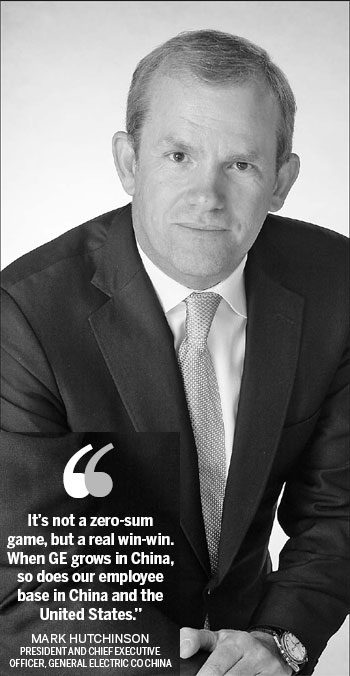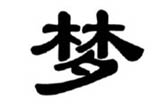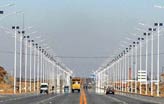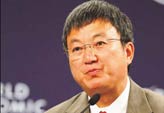GE China's chief sees mutual benefit
Updated: 2011-09-22 07:57
By Shen Jingting (China Daily)
|
|||||||||

President and CEO says cooperation will give impetus to innovation and worldwide expansion
DALIAN, Liaoning - Technology and commercial partnerships between corporate America and rising Chinese business giants can benefit both China and the United States, said Mark Hutchinson, president and chief executive officer of General Electric Co (GE) China.
He said the partnership can create jobs, help innovation and expand markets for the two countries.
GE, the world's biggest maker of power generation equipment and aircraft engines, entered China as early as 1906. It has 50 legal entities, including wholly owned companies, joint ventures and research and development (R&D) centers in China with more than 18,000 employees.
"All of GE's businesses have set up operations in China. We team up with Chinese partners and introduce technologies, innovations, and also our experiences of how to operate as a global player," said Hutchinson in an exclusive interview with China Daily.
The moves raised concerns among some in the US who think the rise of Chinese companies could create formidable rivals who had learned state-of-the-art technologies from US multinationals. The stronger Chinese competitors may limit growth for US companies and, therefore, reduce job opportunities, they said.
"It's not a zero-sum game, but a real win-win. When GE grows in China, so does our employee base in China and the United States," said Hutchinson, who joined GE 17 years ago and was appointed president and CEO for GE China on March 1.
The company exported high-tech equipment, including gas turbines and aircraft engines, to China every year, creating jobs in the US.
GE China does not just focus on China, but focuses globally, he added. GE basically formed 50-50 joint ventures with Chinese companies in the fields in which GE has expertise. Then the two sides will innovate together and obtain global market share together.
"When we think about jobs, we think about jobs here in China. We also think about jobs in the United States. So what GE does is to create thousands of jobs in China and create thousands of job in the United States," Hutchinson said.
GE has 2,200 engineers working at the GE China Technology Center in Shanghai and other R&D facilities in Beijing and Wuxi. The figure is expected to increase by 1,000 by 2012, as the company planned to invest more than $2 billion in a three-year period that ends in 2012 to expand its innovation and customer-support capabilities in China.
In the US, GE expects to add about 15,000 jobs this year, said Jeffrey Immelt, CEO of GE and head of US President Barack Obama's Council on Jobs and Competitiveness. Immelt made the remarks in a CNN interview this month.
Although the world's economy has been sluggish, the expected growth for GE is realistic because of a relatively stronger economic performance in countries such as China, which creates momentum and plays an ever-increasing role in the global economy.
"China is the world's fastest-growing market for aviation, energy, transportation, healthcare and financial services ... (GE's initiatives here) will create jobs in both China and the United States," Immelt wrote in a statement.
Joe Biden, the US vice-president, expressed a similar view that China's rise doesn't spell America's demise. A successful China can make the US more prosperous, not less, he wrote in an opinion piece in the New York Times on Sept 7.
Biden argued China and the US will have a stake in each other's success as trade and investment bind the two countries together. They also share "common challenges and responsibilities" and have incentives to work together on issues "from global security to global economic growth".
"The purpose of GE in China falls on four things, and the first thing is to help China solve its major problems," Hutchinson continued. Some challenges for the Chinese people and the Chinese government are in environment protection, clean energy and the task of improving people's lives in China, and "that's kind of what GE do, actually", he said.
Better innovation

GE traces its beginnings to Thomas Edison, who created the world's first electric light. Edison established Edison Electric Light Co in 1878. In 1892, a merger of Edison General Electric Co and Thomson-Houston Electric Co created GE.
The tradition of innovation is endemic in GE. However, the innovation process has changed greatly from the Edison era, when the work was usually carried out by one individual. Innovation in GE is now more open, globally oriented and emphasizes cooperation.
"Working through partnerships in China benefits innovation. We have US engineers working with Chinese engineers, and we believe it will end up with better products," said Hutchinson.
GE's Shanghai R&D center is one of five the company runs globally. The other four are located in the US, India, Germany and Brazil.
Engineers in China work on developing products for China and also for the global market. The company recently launched a handheld ultrasound device that can be used in any place people want. The product was developed in conjunction with all the research centers around the world.
In addition to R&D centers, GE also set up innovation centers in China. Customer innovation centers are about to be established in six Chinese cities, with Chengdu, Shenyang and Xi'an selected for the first phase.
The innovation centers will focus on product development, engineering for applications, sourcing support and delivery in key development areas for China such as rural healthcare, renewable and clean energy, smart grid and aviation.
"They are really in China for China," Hutchinson said. The one in Chengdu will focus on healthcare to develop more affordable and accessible products for people in China. The Xi'an center is set to focus on lighting to innovate world-class LED light, and the Shenyang center will look to develop clean energy products.
GE also encourages more Chinese people to be involved in innovation. The company plans to team up with a number of venture capital companies to collectively invest $100 million in an innovation competition starting this month.
"GE committed $200 million in the United States last year to challenge people, so if you have an idea about clean technology, if anybody has an idea about a business plan (on that topic), they could approach us and we could consider investing in their ideas," he said. The activity achieved great success last year, and the company is going to launch exactly the same thing in China, focusing on gas and gasification.
Going Global
One of the major purposes for GE doing business in China is to create global partnerships based in China, Hutchinson said.
"We see Chinese companies are thinking about growing globally. GE is a kind of perfect partner. In our joint ventures in China we are innovating together with our Chinese partners and we are attacking global markets together," he said.
Over the past 12 months, GE formed 10 new partnerships with Chinese State-owned enterprises in key high-tech sectors. "We will do more joint ventures in China in the future," he added.
During Chinese President Hu Jintao's state visit to the US earlier this year, GE signed four cooperation agreements with its Chinese partners in the fields of clean energy, aviation and rail transportation.
"These deals will help strengthen the critically important US-China bilateral economic relationship," said GE Vice-chairman John Rice in a statement.
Among those deals, GE energy cooperated with Shenhua Group Co to set up a joint venture and develop coal gasification technologies in China, a move that is key to commercial-scale deployment of cleaner coal solutions.
GE Aviation formed a partnership with Aviation Industry Corporation of China (AVIC) to develop and market the new generation of avionics systems to support the development of China's first home-grown big passenger jet.
"These joint ventures are local-oriented but also global-oriented. They are all going to be global businesses," Hutchinson said.
Because the US is still the largest consumer market in the world, more Chinese companies are aiming to enter the market there. Hutchinson suggested they can learn from GE's experiences in China - firstly by building local partnerships in the targeted market.
"Encouraging Chinese companies to make investments in the US is an important direction for US-China bilateral cooperation. GE can play an active role in introducing Chinese partners to the US market," he said.
The economic relationship between China and the US still experiences an imbalance. Muhtar Kent, chairman of the US-China Business Council who also acts as chairman and CEO of The Coca-Cola Company, said China exports three times what it imports from the US.
At the same time, Chinese companies made only a small fraction of all investments in the US of about $5 billion, while US companies have invested about $100 billion in China, according to figures from the US-China Business Council.
However, Kent said in an earlier interview with China Daily that he was optimistic about economic cooperation between the two countries. "We believe both of those imbalances will get smaller in the next 10 years," Kent said.
China Daily
(China Daily 09/22/2011 page14)











